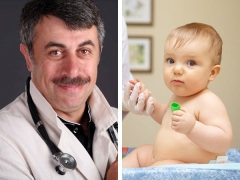Dr. Komarovsky about neutropenia in children
All parents take their children to the polyclinic to donate blood. Moms and dads know that lab technicians are testing the blood for hemoglobin, to determine the number of other blood cells, the functions and purpose of which remain a great mystery to patients. And because the diagnosis, which is sometimes made after a child’s blood tests, is neutropenia, causes horror and a lot of questions. About this tells the famous children's doctor Yevgeny Komarovsky.
Neutropenia in children is a decrease in blood of a certain type of white blood cells. (cells involved in immune processes). These white blood cells are the most numerous and are called neutrophils. They are created by nature to combat the bacteria that cause the most various diseases. These cells are produced by the defenders of the bone marrow, after which they enter the bloodstream and proceed to "patrol" the body, which lasts 6 hours. If during this time they find a bacterium with which to fight, the process of its destruction begins. If not found, they are replaced by a new batch of neutrophils. When there is a shortage of these cells, the child becomes most vulnerable to various diseases.
What it is?
Any disease, be it viral, bacterial or parasitic, can cause a decrease in the number of "workable" neutrophils. Vitamin B12 deficiency, malignant diseases of the bone marrow (leukemia, etc.) can lead to neutropenia, sometimes the number of neutrophils is reduced in diseases of the spleen and pancreas. Thus, doctors, after identifying the causes, are obliged to add another word to the diagnosis “neutropenia” - either it is benign or malignant.
In children up to a year, according to Komarovsky, the benign form of the disease, the so-called cyclic neutropenia, is often diagnosed, in which the number of such important leukocyte-neutrophils increases or decreases. This situation does not require much treatment, and she goes closer to the age of three.
The most severe type of the disease is autoimmune. With her, the child’s immunity for some reason considers neutrophils to be foreign agents and actively destroys them. With this form, qualified medical assistance is required.
Treatment according to Komarovsky
Adequate treatment implies knowing the exact cause due to which there was a decrease in the number of neutrophils in the blood:
- The bone marrow is damaged by a strong viral infection. This is usually a temporary phenomenon, it will require maintenance therapy.
- Agranulocytosis. Congenital pathology, distinguished by a particularly severe course. May require antibiotic therapy with additional effects of drugs on the growth of neutrophil colonies. Sometimes such a child needs a bone marrow transplant.
- Benign neutropenia. Mild form of congenital or acquired nature, treatment in the mild stage does not require. In the middle it is possible to prescribe maintenance therapy
- Permanently recurrent form of the disease. If a cell deficiency is found every 3-4 weeks, the child often has stomatitis, then antibiotics can be prescribed for him, as well as to prescribe drugs that affect the growth of granulocyte colonies.
- Neutropenia with exhaustion. If the child is exhausted, he has a deficiency of vitamin B 12, as well as folic acid, treatment will be aimed at eliminating such a deficiency by prescribing vitamin therapy and folic acid drugs, as well as nutritional correction.
- Medical form. If the pathology has appeared on the background of taking certain medications, they should be immediately canceled and supportive treatment should be provided if necessary.
- Autoimmune idiopathic form.When it is not possible to establish the exact cause. The child is prescribed corticosteroids and intravenous administration of immunoglobulin.
- Neutropenia of the newborn. Congenital problem associated with inhibition of fetal neutrophils by maternal antibodies. In her case, the child is given supportive treatment, sometimes the condition itself normalizes within a few days.
How to prevent the effects of neutropenia, see the following video.















